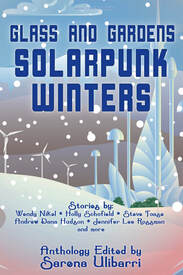 Guest Blog by Jerri Jerreat Climate Change is raging across my country, Canada. Imagining Toronto, Canada in the future was not difficult. Already, in Ontario, we have unusual hurricanes, tornados, and freezing rain when we ought to have fresh white snow. Our western provinces suffer from unstoppable wildfires and black skies full of smoke; our east coast is losing beautiful beaches and land to rising sea levels, and facing fiercer storms. The fun challenge was to imagine how we might create solutions to cope with these changes, solutions not based on fossil fuel. Researching all the latest technologies was fascinating. A story, however, always needs to come first. I could preach my solutions, wave them on placards, and attend climate strikes. (On that already.) A short story, I believe, has to grab you, then yank you into the excitement of a person or people in a difficult situation that feels real. The characters have to come alive, and their problems need to become yours. In daily life, I am a teacher, yet I have never written about teaching before, either from the point of view of a student or teacher. I rifled through my memories as a child, a follower at age eleven who, for some inexplicable reason, became a minion to a class bully. Joanne ruled us with her charisma, and we shoplifted and did many things I am not proud of. The one that still haunts me was the unkindness we showed to a new foreign classmate. I have shared that sad story with my own classes, year after year, hoping to guide my students into wiser choices. Some of the scenes are echoes of real discussions with my classes. With grade fives, I always devote a few lessons to imagining that we are the very first group of humans to decide to stop, settle down, and live in a community. What rules should we have to live together peacefully? Every year the students engage in thoughtful and sometimes humorous discussions. One year we built a large village centre together in the schoolyard, using snow. We also write a play together each year. Often a character or two are recent refugees, which allows us to feel a little of the outsider experience, perhaps coming from war-torn Syria, speaking a different language. Whether the play ends up being about a group of comical extra-terrestrials visiting Earth, or a spoof on teenagers, or a play about anxieties ten year olds in our class face — we all learn a little compassion for other people through our writing and our acting of the play. This, I suppose, is my secret teacher mission — to teach open mindedness and open heartedness. Simple ideas became the heart of this story: a child bully, a child victim, and a teacher who won’t let it happen again. Then I set it in Toronto, in the future. Enjoy. Jerri Jerreat's ten-year-old students fought Ontario last year to ban single-use plastic. Environmental themes often emerge in her fiction, which has appeared in Ottawa Arts Review, Yale Review Online among others and in Nevertheless: Tesseracts 21 and Glass and Gardens: Solarpunk Summers. She lives under solar panels near Kingston, Ontario. www.jerrijerreat.com
0 Comments
Your comment will be posted after it is approved.
Leave a Reply. |
World Weaver PressPublishing fantasy, paranormal, and science fiction. Archives
February 2024
|
- Home
-
Books
-
All Books
>
- Beyond the Glass Slipper
- Bite Somebody
- Bite Somebody Else
- Black Pearl Dreaming
- Cassandra Complex
- Causality Loop
- Clockwork, Curses, and Coal
- Continuum
- Corvidae
- Cursed: Wickedly Fun Stories
- Dream Eater
- Equus
- Fae
- Falling of the Moon
- Far Orbit
- Far Orbit Apogee
- Fractured Days
- Frozen Fairy Tales
- Glass and Gardens: Solarpunk Summers
- Glass and Gardens: Solarpunk Winters
- Grandmother Paradox
- Grimm, Grit, and Gasoline
- Haunted Housewives
- Heir to the Lamp
- He Sees You When He's Creepin': Tales of Krampus
- Into the Moonless Night
- Jack Jetstark's Intergalactic Freakshow
- King of Ash and Bones (ebook)
- Krampusnacht
- Last Dream of Her Mortal Soul
- Meddlers of Moonshine
- Mothers of Enchantment
- Mrs Claus
- Multispecies Cities
- Murder in the Generative Kitchen
- Recognize Fascism
- Scarecrow
- Sirens
- Shards of History
- Shattered Fates
- Skull and Pestle
- Solarpunk (Translation)
- Solarpunk Creatures
- Solomon's Bell
- SonofaWitch!
- Speculative Story Bites
- Trenchcoats, Towers, and Trolls
- Weredog Whisperer
- Wolves and Witches
- Anthologies and Collections
- Novels
- Novellas
- Fairy Tale
- Fantasy
- Romance
- Science Fiction
- Urban/Contemporary Fantasy
- Young Adult SFF
-
All Books
>
- Blog
- About
- Contact
- Press / Publicity
- Newsletter Signup
- Privacy Policy
- Store


 RSS Feed
RSS Feed